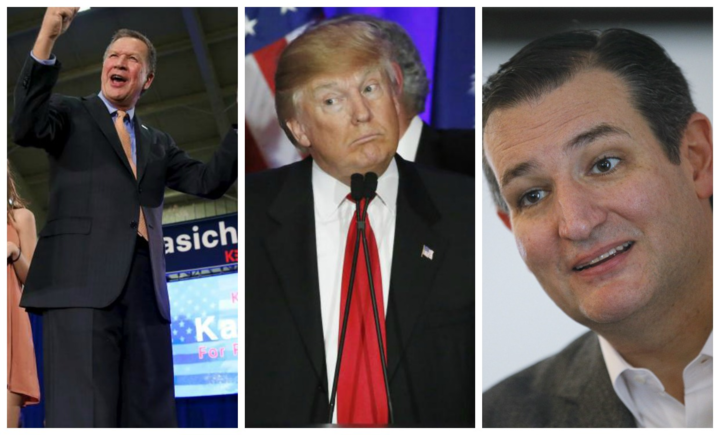
All three remaining Republican presidential candidates have vowed to support their party's presidential nominee, but now each of them—Donald Trump, Ted Cruz and John Kasich—is wiggling out of his commitment, a move that could hurt GOP chances to take back the White House.
In September, Republican Party officials asked the GOP candidates to sign the pledge to support the party's eventual nominee. At the time, the large GOP field included more than a dozen candidates, all of whom vowed to do so. In most years, this is pretty much pro forma, but Trump's controversial campaign made it a sticky issue. Would Trump vow to support the nominee, and if the mogul secured the nomination, would others including all of those he has insulted, do the same?
When asked during a live CNN Wisconsin town hall on Tuesday night whether he still vows to back the Republican nominee, Trump said, "No, I don't anymore, no. We'll see who it is." The GOP front-runner seemed to back off his earlier promise.
"I have been treated very unfairly," the real estate tycoon continued, pointing a finger at the Republican National Committee (RNC) and figures in the GOP establishment. But then he added, "I love the Republican Party," thus leaving it unclear whether he would back one of his opponents later this year.
Shortly after announcing his bid for the presidency last June, Trump said he might consider running as a third-party candidate if he doesn't land the Republican nomination. He cited what he called the RNC's lack of support. Two months later, he announced that he had signed the loyalty pledge to the Republican Party, which prevents him from running as a third-party candidate. The party had put pressure on him to sign the pledge, fearing a divide in the Republican vote this fall and a step toward guaranteeing the Democrats would clinch the race.
A poll released last December found that 68 percent of Trump's supporters said they would vote for him even if he leaves the Republican Party and runs as an independent contender. That move, experts agree, would all but guarantee Hillary Clinton's election should she be the Democratic nominee.
Trump reiterated his beliefs the next morning, telling ABC News's Good Morning America on Wednesday: "I just want to see who the GOP nominee is.… I only want the people to support me."
He added: "I will take my chances with the people. I don't need Ted Cruz's support."
In the past, members of a party and interest groups rarely have opposed a nominee of their own party. No Republican member of Congress backed Lyndon Johnson in 1964 when controversial Barry Goldwater headed the Republican ticket. It was notable in the 1972 presidential election when George Meany, then the president of AFL-CIO, declined to endorse Senator George McGovern as the Democratic nominee. The decision from the largest federation of unions in the United States contributed to McGovern's stumbling campaign against incumbent President Richard Nixon.
CNN's Anderson Cooper asked Cruz and Kasich the same question as Trump on Tuesday. Compared with the billionaire's response, neither candidate directly said he would continue to support the eventual candidate. First, Cruz said nominating Trump would hand the election to Clinton. He also said he's "not in the habit of supporting someone who attacks my wife and children."
The battle between Trump and Cruz became personal when the front-runner last week falsely accused Cruz of creating an advertisement that featured an image of his wife, Melania, posing naked on a fur carpet. The New York billionaire then threatened the Texas senator he would "spill the beans" on his wife, Heidi.
Kasich was the third and final candidate who took the stage with Cooper on Tuesday. He said he wants to see what happens to the campaigns.
"If the nominee is somebody that I think is really hurting the country and dividing the country, I can't stand behind them," Kasich said.
But Wisconsin Governor Scott Walker, who formerly was a Republican presidential candidate and has endorsed Cruz, on Wednesday said members of his party across the country, and certainly in his state, ultimately will throw their support behind the chosen candidate.
"Right now they're all saying it because they want to be the nominee," he said during an interview with Fox News. Walker suspended his presidential campaign in September.
Uncommon Knowledge
Newsweek is committed to challenging conventional wisdom and finding connections in the search for common ground.
Newsweek is committed to challenging conventional wisdom and finding connections in the search for common ground.
About the writer
Michele Gorman is a Newsweek political reporter, with a focus on gun policy. She previously worked at msnbc.com, where she ... Read more





